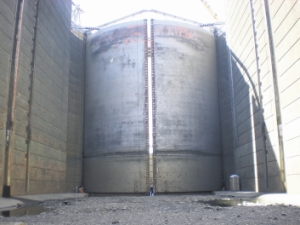forum
library
tutorial
contact

Shipping on Rivers to Shut Down for 14 Weeks
by Cathy KessingerTri-City Herald, November 6, 2010
|
the film forum library tutorial contact |

|
Shipping on Rivers to Shut Down for 14 Weeks
by Cathy KessingerTri-City Herald, November 6, 2010 |
 It could be a long winter -- and an expensive one.
It could be a long winter -- and an expensive one.
A historic 14-week shutdown of shipping on the Columbia and Snake rivers beginning in December will mean higher gas prices and perhaps some fuel shortages for Mid-Columbia drivers.
During the closure, thousands more semi-trucks also will travel the region's highways, and more trains will be barreling down the tracks and stopping traffic as they move through cities.
The Columbia-Snake River System is the lifeblood of agriculture and industry in the region, annually carrying 40 million tons of cargo worth $17 billion.
(bluefish recommends: Navigation Tonnage
Summary by Commodity by Army Corps of Engineers, Walla Walla District
and Major Exports from Columbia River, from "The Great Waterway", 1997
The $50 million improvement project, paid for by federal stimulus dollars, will mark the first time the river system has been shut down for more than a week or two. Work on the locks that move barges past the dams is sorely needed, as many of the parts have not been replaced since the dams were built decades ago.
The Army Corps of Engineers will replace and test downstream navigation gates at The Dalles, John Day and Lower Monumental dams. The gates weigh from 350 to 1,000 tons, and the Lower Monumental Lock gate is as tall as an eight-story building, 15 feet thick and nearly 90 feet wide.
People from the farm fields of the Mid-Columbia to Portland to Spokane to Japan have been planning more than a year for the closure.
But the petroleum industry has been closed-mouthed with state and federal officials about its plans.
The fierce competitiveness of the petroleum industry and little state regulation means a free market will set the prices for drivers and businesses in the region during the lock closures.
Mark Anderson, senior energy policy specialist for the Washington Department of Commerce, said that the state hasn't studied what the impact might be, but Washington and Oregon officials said they would monitor fuel supplies.
"(We are) ... anticipating some kind of price increase," said Anderson, who is Washington's point person on fuel supplies during the closure.
Oregon is using the same approach.
"When it comes to price, no state agency has authority over that," said Deanna Henry with the Oregon Department of Energy.
Officials say increased prices might help keep demand down if drivers stay home instead of paying higher gas prices.
Tidewater, the region's major shipper on the Columbia system, will park six barges full of fuel in Pasco. The 228,000 barrels on those should last three weeks.
Bob Cederbloom, operations manager at Wondrack Distributing in Kennewick, said the company is working to do what it can to keep diesel flowing for its customers -- primarily truckers. The company is planning to store as much diesel on barges as it can, but that strategy has limits.
"At some point you run out of empty barges," Cederbloom said. "It's going to get real interesting."
The company also will truck diesel from Seattle and restrict some Boise, Idaho, customers who come to the Tri-Cities to buy diesel because it's cheaper here.
"Will it last?" Cederbloom said. "I don't know. It could get dicey."
Petroleum dealers are working to make sure there is diesel and gas available in the region during the closure.
Distributors will store as much fuel as they can in this area and get additional fuel where they can.
RE Powell Distributing, which has an office in Pasco, will truck in fuel from Seattle, but it will cost more than shipping on the river. Some petroleum dealers will truck fuel over from the west side of Washington.
"We will be able to pull it from the west side and utilize what storage we can," said Jeff Bonnington, the company's Pasco plant manager.
Still, it will take a lot of trucks to make up for the barges, as one four-barge tow can carry 14,000 tons of cargo. It would take more than 480 trucks to carry that weight.
The U.S. Coast Guard estimates an additional 1,750 tanker trucks will hit the highways just to carry fuel during the locks closure.
Many farmers shipped their wheat early this season, moved it to trucks and trains or bought extra storage space to hold on to it until after the shutdown.
And while the closure comes at the best time for farmers, it can be a treacherous time for more trucks on Eastern Oregon, and Central and Eastern Washington highways.
Forecasters predict a cold and wet winter, according to a report prepared by Tom Dunklee of the Global Climate Center. That could mean more winter storms to wreak havoc with transportation.
Interstate 84 is a major transportation corridor, but bad weather can close the highway -- either in the Blue Mountains or the Columbia River Gorge. Snoqualmie Pass over Interstate 90 also can get hit with bad weather.
Anderson said if a winter storm or some other emergency occurs, the region could see short-term supply problems.
The state wouldn't step in unless there was "some extreme problem with price or supply," he said.
The one bright spot to the locks closure might be lower fuel prices for Western Washington, where there will be a more than adequate supply of fuel, Anderson said.
"You'll probably find lower prices west of the mountains," he said. "You'll have an oversupply there."
learn more on topics covered in the film
see the video
read the script
learn the songs
discussion forum
